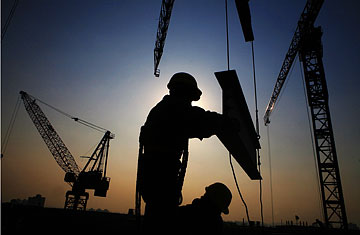
Builders work at the construction site of the China Pavilion for the World Expo Shanghai 2010 on December 31, 2008, in Shanghai
At a time of plunging stock markets, bank bailouts and deepening recession, the economic data released by the Chinese government on Thursday might be enough to make many drool. GDP for the world's third-largest economy surged 9% in 2008 from the year earlier. But first looks can be deceiving. The statistics also showed just how quickly and severely the global economy decelerated in the latter part of the year. China's growth in the fourth quarter, at 6.8%, was the slowest the country has experienced in seven years. Compare that figure to the first half of 2008, when growth was more than 10%, and in 2007, when China posted an eye-popping 13% rate. As Stephen Roach, chairman of Morgan Stanley Asia, put it: "China hit a wall late last year."
The new economic reality has been jarring for a country considered not long ago nearly impervious to the global slowdown. With consumer spending declining in the U.S., China's export machine — which accounts for some 20% of GDP growth — has run out of steam. Exports fell 2.8% in December, the worst performance since 1999. (See pictures of the global financial crisis.)
To support struggling manufacturers, the government over the past six months has restored or raised tax breaks on more than 3,700 export items, including consumer goods like toys. The rebates could make Chinese exports even cheaper, but that doesn't mean cash-strapped shoppers in the U.S. and Europe will exercise their credit cards. HSBC estimates China's exports could contract by as much as 19% in the first quarter of 2009. "The international financial crisis is deepening and spreading, with continuing negative impact on the domestic economy," Ma Jiantang, the head of China's statistics bureau, told reporters.
The sudden plunge in exports has taken its toll on China's industrial heartland — southern Guangdong province. Jing Ulrich, chairman of China equities at JP Morgan in Hong Kong, believes some 60,000 businesses closed in the region, and the government estimates about 10 million migrant workers are unemployed. The downturn has put "huge stress on the job market," says Credit Suisse economist Dong Tao, which "could cause some social unrest. That's my worry."
It is the big worry of Beijing's leadership as well. In a frantic effort to preserve jobs, officials are trying to stimulate the domestic economy to make up for lost export growth. In November, the government announced a $586 billion stimulus package, much of which is new infrastructure spending. Taxes on some real estate transactions were also suspended late last year to boost the sagging property sector, which accounts for some 10% of national employment. More steps are likely to come. Analysts expect the government to introduce measures to support the steel and auto industries.
Still, the transition from an outward-oriented growth model won't be easy. Though consumer spending has remained healthy — retail sales grew 19% in the fourth quarter — economists don't think the average Chinese has a big enough wallet to make up for weak demand overseas. "The reliance on the U.S. consumer as the buyer of last resort is going to have to change," says Michael Buchanan, chief Asia economist at Goldman Sachs in Hong Kong. He says "China has a long way to go in adjusting" to this fundamental change in the world economy.
Buchanan's forecast for China's GDP growth in 2009 is among the most bearish: 6%. If he's right, that would be the lowest rate since 1990. But the data released Thursday did show some unexpected signs of life. Industrial production revived slightly in December, and loan growth surged. Merrill Lynch said in a report that the fourth quarter of 2008 and this current quarter could be "the trough of this growth cycle," as government stimulus and loose monetary policy begin to boost domestic demand. The data gave enough hope to Credit Suisse's Tao to convince him to keep his 8% GDP growth estimate for 2009. "Double-digit growth won't come back in the next two to three years," says Tao, but the country is still better off than most. "China has one leg on a knee, but the rest of the world is lying flat," he says. Maybe the world should be envious of China after all.
